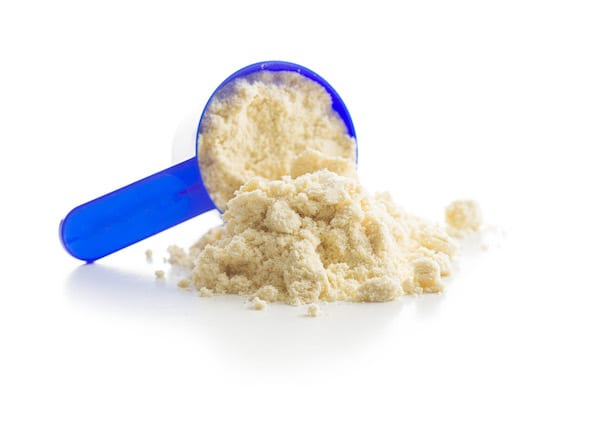There are so many different protein powders available on the market, it can be hard to choose one. Many powders are whey-based, which is an animal protein, but then there are soy and pea powders, which are plant-based.
If you’re curious about the main differences and similarities between whey vs. plant protein, we’re here to help!
What Is Whey Protein and What Is Plant Protein?

Whey protein is one of the main proteins found in cow’s milk (the other is casein). Plant proteins, on the other hand, come from a variety of different plant sources.
“The most common plant protein powders are soy, pea, and hemp,” says Mascha Davis, MPH, RDN, and author of Eat Your Vitamins. You can find pea protein in Chocolate Plant-Based Vegan Shakeology, for example.
She explains that some brands blend proteins from different plant sources to make it complete. “This means that when blended together, all essential amino acids are present in the powder,” she says. (Whey is a naturally complete protein.)
Although there are many different plant proteins to choose from with varying ingredients and nutrition labels, there are some primary differences and similarities between the average plant-based protein and whey, according to Davis:
Differences between whey and plant-based proteins
- Whey comes from cow milk; plant-based proteins do not contain animal products, making them suitable for vegetarians and vegans.
- Whey protein is always complete; some plant proteins or blends may be incomplete, depending on their mix of vegetable based proteins. Additionally, “the amino acid profile of each plant-based supplement might be slightly different depending on the blend used,” Davis says, while whey will be fairly consistent.
- Whey protein powders offer roughly the same amount of protein from brand to brand; plant-based powders can vary significantly depending on the type of plant protein used.
- Whey is often mild in flavor; plant protein powders can be earthy, nutty, and sometimes bitter.
- Generally, plant proteins may require less land, water and energy to produce, compared to animal proteins.
Similarities between whey and plant-based proteins
- Both whey and plant-based protein powders provide protein, which can help you refuel and repair muscle after a workout, according to research.*
- Both types of powder can be easily mixed into a shake for a quick snack or meal.
- There are multiple flavors available for both whey and plant protein powders.
Which Is Better?

When it comes to the great battle of whey vs. plant-based proteins, Davis says there’s limited evidence touting one over the other.
In fact one study, which put whey and pea protein head to head, found both options produce similar outcomes for key metrics including body composition, muscle thickness, force production, performance, and strength after following an eight-week high-intensity functional training protocol.*
“Muscle growth is a result of training your muscles,” Davis says. “The protein powders are simply a tool to replenish losses easily.”
Which Should I Choose?

When choosing between whey and plant-based protein, it really comes down to your personal preference, including dietary choices and allergies.
Whichever you choose, make sure to take a look at the label. Many protein powders — both whey and plant-based — may have added ingredients such as artificial sweeteners, thickeners, and artificial flavors and colors. “Try to avoid those high in additives,” Davis says.
If you opt for whey protein, just know there are three different types that have varying protein content:
Beachbody Performance Recover, which has both whey and plant-based formulations, provides 20 grams of high-quality protein per scoop to aid muscle recovery, along with pomegranate extract to help reduce post-workout soreness.
For a healthy snack packed with plant-based protein, try any of our plant-based vegan Shakeology flavors: Chocolate, Vanilla, Cookies & Creamy, Cafe Latte, Tropical Strawberry, and Snickerdoodle. They include 16 to 17 grams of pea protein, probiotics, and helpful fiber and minerals.
And remember that while protein powders can help you consume more protein throughout the day, you can also bump up your protein intake with whole foods. Check out our list of lean protein foods and vegan protein sources that you can add into your meals, no matter your dietary preferences.
*These statements have not been evaluated by the Food and Drug Administration. This product is not intended to diagnose, treat, cure, or prevent any disease.

